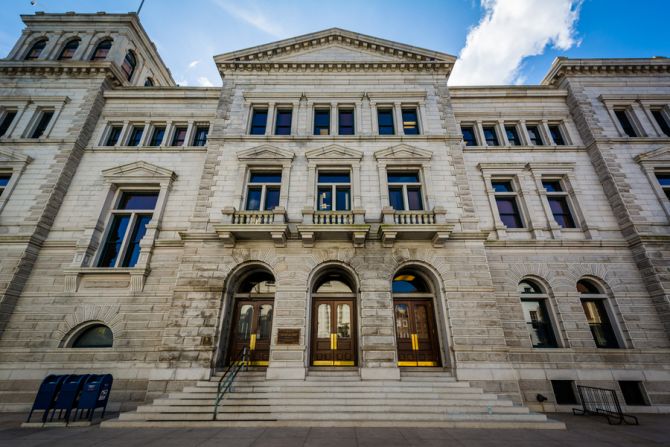Catholics and others challenging South Carolina’s Blaine Amendment are right to argue that the amendment was “born of bigotry and prejudice, based on race and religion,” two scholars say.
The state’s Blaine Amendment - a constitutional ban on public funds for private religious schools - was enacted amid efforts by those schools to educate freed slaves and Catholic immigrants, said University of Notre Dame law professor Nicole Stelle Garnett and Daniel T. Judge, a student fellow at Notre Dame Law School’s Religious Liberty Initiative, in a May 20 essay.
Currently, the Catholic Diocese of Charleston and an association of colleges that includes several historically Black colleges are challenging South Carolina’s Blaine Amendment in court. They charge that it unlawfully shut off Catholic and other schools from critical relief funds during the coronavirus pandemic.
“The plaintiffs should prevail. It is time to end the shame of Blaine,” Garnett and Judge wrote in a May 20 essay for Real Clear Policy.
The Blaine Amendment dates back to 1875, when U.S. Rep. James Blaine, a Maine Republican, proposed a constitutional amendment to ban public funding of “sectarian” schools, often run by or for Catholic immigrants. Blaine’s federal amendment failed, but it inspired similar amendments to many state constitutions and was added to South Carolina’s constitution in 1895.
“The Blaine Amendment advanced the goal of disenfranchisement because, in the decades following the Civil War, missionaries from many faith traditions, including some that founded the institutions operated by the plaintiffs in the case, came to South Carolina with the express purpose of educating freed slaves,” Garnett and Judge said.
“By blocking public support for these admirable institutions, the law inhibited religious missionaries from helping freed slaves and Catholic immigrants receive the education opportunities they needed to qualify to vote,” they wrote.
Blaine Amendments, in the view of Garnett and Judge, were also “a blatant attempt to decrease the influence of Catholic immigrants throughout the United States.”
“At the time, Catholic immigrants were viewed as dangerous and anti-American because of their perceived loyalty to the Pope. To this day, thirty-seven states still have a Blaine Amendment in their constitution,” Garnett and Judge said.
Last year South Carolina Gov. Henry McMaster had designated $32 million in federal aid to help low- and moderate-income families in enrolling or remaining in private schools during the pandemic; he set aside another $2.4 million to assist with health upgrades and distance-based learning technology at the state’s historically Black colleges and universities, most of which are private.
However, the state Supreme Court blocked these efforts, citing the prohibition on public funding of private schools under the state’s Blaine Amendment.
The lawsuit of the Charleston diocese and the coalition of schools argues that the amendment violates the free exercise and equal protection clauses of the U.S. Constitution.
Garnett and Judge recounted the historical context of the amendment. South Carolina’s 1868 state constitution, passed in the post-Civil War period known as Reconstruction, had sought to enforce education reform and racial equality. The Constitution of 1895, however, “sought to reverse Reconstruction efforts and implement Jim Crow laws throughout the state,” they said.
This constitution, which included a Blaine Amendment, was created in a constitutional convention under “Pitchfork Ben” Tillman, then the state’s Democratic governor, who would eventually become a U.S. Senator.
“Tillman was an avowed racist, who some argue did more to implement the Jim Crow system than anyone else in history,” Garnett and Judge said.
The state’s constitutional convention implemented a literacy requirement for voting, which disenfranchised both Blacks and illiterate whites, including many immigrants.
“Unsurprisingly, racial animus pervaded the 1895 Convention, and the historical evidence suggests that anti-Catholic fervor influenced it as well,” Garnett and Judge added.
For the many delegates to the constitutional convention who were anti-Catholic, they said, “the Blaine Amendment had the important side benefit of (in the word of one prominent Tillmanite) defanging ‘America’s most dangerous and deadly foe,’ the Roman Catholic Church.”
The law is “not just a disgraceful relic of the past,” said the Blaine Amendment critics. “(I)ts harms persist since it continues to prevent private and religious schools from receiving support that is otherwise generally available to advance their good work on behalf of the citizens of South Carolina, even when these good works are most needed in the midst of a global health crisis.”
Some legal trends appear to be moving against state Blaine Amendments.
In June 2020, the Supreme Court ruled in a 5-4 decision that the Montana state constitution’s ban on public funding of religious institutions violated the First Amendment. The provision constituted “discrimination against religious schools and the families whose children attend them,” the majority opinion stated. That case concerned a ban on students at religious schools benefitting from a state scholarship program funded by tax credits; while the state supreme court revoked the entire program, the U.S. Supreme Court ruled it did not have the authority to do so and further ruled against the state’s amendment.
In the 2017 case Trinity Lutheran Church of Columbia v. Comer, the high court decided against Missouri’s application of its Blaine Amendment, ruling that the state’s policy of barring a church of a public benefit because of its religious status violated the First Amendment.

